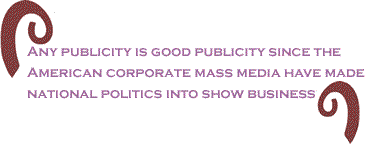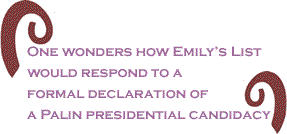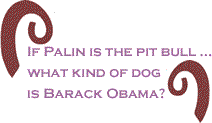
|
||||||||||||||||||||||
|
||||
 |
||||
The
successful politician Barack Obama published two memoirs before
being elected President of the It was John McCain�s 2008 campaign
team that made Sarah Palin his vice-presidential pick, and that
criticized Obama as a lightweight celebrity, associating him in
a campaign media hit with Paris Hilton. On a more serious note, how can we understand Palin�s media and apparent political appeal in this moment? Four factors must be considered. The first, already addressed, is our mass mediated celebrity culture. The second is the figure of Barack Obama in both American popular and elite cultures. The third is the widespread disinformation about the American class structure reflected in the absurd notion that most Americans are middle class. Finally, the �going rogue� of her memoir�s title is a revealing phrase. It is just shy of �going postal.� The former invokes individualist
rebellions of the relatively poor and powerless against the strictures
of large bureaucratic organization. The latter may well increase
as despair deepens among those disenfranchised and unemployed Americans
who have guns. George W. Bush, grandson of a Senator, son of a President,
and a Like her, Obama has modest family
beginnings. Since the major parties serve the American plutocracy,
their candidates after election almost never serve the American
people. The Bush and Obama administration bailouts, not surprisingly,
showed special solicitude for the wealthy. A year later, with official
national unemployment at 10.2% and rising, the Obama White House
holds a jobs summit. Quite likely too little, too late. Obama surrounds
himself with elite educational products that are clueless about
the 74% of Americans who lack four year college degrees. Obama developed his communication
style in the elite educational milieu of the Another specter haunting the
Obama administration, even though it includes Cabinet member Hillary
Clinton as the Secretary of State, is the liberal feminist aspiration
for legislative and executive branch power. Following If liberal feminism reflects the aspirations of elite American women, there is a potentially more attractive Republican candidate who is a woman of color. Condoleezza Rice, the Bush administration�s former National Security Advisor and Secretary of State, is currently writing her own memoir. Rice�s story is similar to Obama�s, one of rapid career ascent after significant achievement in the historically white precincts of American higher education. It contrasts sharply with Palin�s educational struggles as a young mother raising a family. More Americans can identify with Palin�s educational and family struggles than with Rice or indeed Obama�s educational success stories. Further, Rice speaks, like both Obama and Hillary Clinton, in the highly educated accent that signals �plays well with plutocrats.� These are liabilities for prospective candidate Rice as against Palin. That Obama became a star in
the national popular media during the election campaign was shown
by the McCain campaign�s criticism of his celebrity status. Perhaps
inevitably, Obama�s star is losing its luster as his administration
governs. Sarah Palin works hard on her
profile in highly mediated BlackCommentator.com
Guest Commentator, John Hayakawa Torok, is a critical race theorist
and card-carrying member of the |
||||
 |
||||
If you would like to comment on this article, please do so below. There is a 400 character limit. You do not need a FaceBook account. Your comment will be posted here on BC instantly. Thanks. Entering your email address is not mandatory. You may also choose to enter only your first name and your location.
|
||||
Thank you very much for your readership. |
||||
| Any BlackCommentator.com article may be re-printed so long as it is re-printed in its entirety and full credit given to the author and www.BlackCommentator.com. If the re-print is on the Internet we additionally request a link back to the original piece on our Website. | ||||
| |
||||
| December
3 , 2009 Issue 353 |
| Executive Editor: Bill Fletcher, Jr. |
| Managing Editor: Nancy Littlefield |
| Publisher: Peter Gamble |
| Est. April 5, 2002 |
| Printer Friendly Version in resizeable plain text format |
 |

|
 |
| |
| |

































 Such
degrees provide minimum access to technical and critical skills
workers need to do well in a largely post-industrial, information
economy. The �undereducated� are overrepresented among the unemployed,
involuntarily part-time employed, and those who have despaired of
finding employment at all. Palin�s personal story, and her communication
and cultural style, appeals to these demographics. Her ideological
anti-tax message, however, is of the American plutocracy.
Such
degrees provide minimum access to technical and critical skills
workers need to do well in a largely post-industrial, information
economy. The �undereducated� are overrepresented among the unemployed,
involuntarily part-time employed, and those who have despaired of
finding employment at all. Palin�s personal story, and her communication
and cultural style, appeals to these demographics. Her ideological
anti-tax message, however, is of the American plutocracy.
 Obama�s
message staff can, however, be tone deaf to how the American class
structure permeates the national popular media. The White House
garden �beer summit� fiasco shows this.
Obama�s
message staff can, however, be tone deaf to how the American class
structure permeates the national popular media. The White House
garden �beer summit� fiasco shows this.










